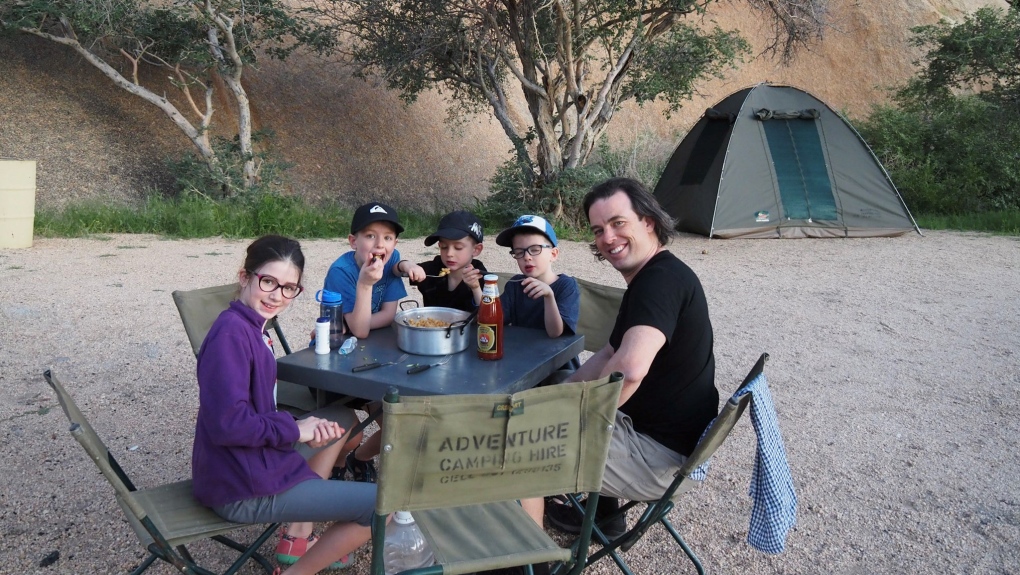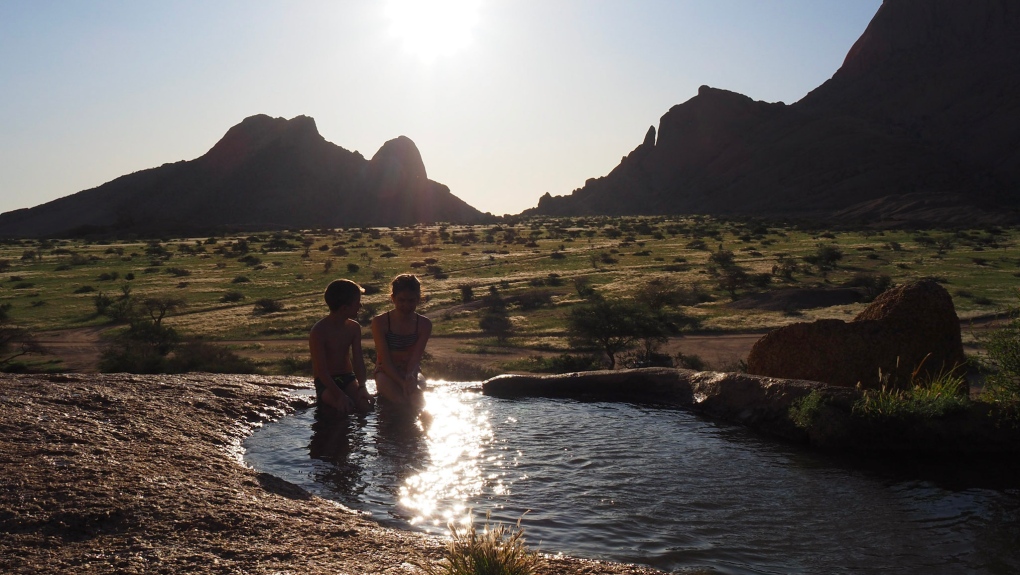'See the world through their eyes': Quebec family on a quest to travel the globe before children lose their vision
Edith Lemay and Sebastien Pelletier touched down in Africa last week with a few goals in mind: over the next year of travel, the couple hope to introduce their children to new cultures, teach them about resilience, and strengthen their bond as a family.
But most of all, they want to give their kids as many "visual memories" as possible — memories they can cherish long after losing their eyesight.
"Especially big, wide space[s], because that's something that they're gonna lose," Lemay said.
Speaking to CTV News from Namibia, the couple explained that three of their four children have a retinitis pigmentosa, a rare genetic condition which causes vision loss over time.
The problems began when Mia, now 11, was around 18 months old.
"We realized at night, she couldn't see," said Lemay. "She would bump into walls or furniture."
It took a few years to get an answer. When it finally came, it was recommended Lemay and Pelletier test their other children as well.
 Mia, Leo, Laurent and Colin will be homeschooled over the next year while they travel the world. (Edith Lemay/Sebastien Pelletier
Mia, Leo, Laurent and Colin will be homeschooled over the next year while they travel the world. (Edith Lemay/Sebastien Pelletier
Mia's little brother Leo was in the clear, but the two youngest — Colin and Laurent — shared her diagnosis.
"We knew, because they didn't see in the dark, other than Leo," said Pelletier.
The deterioration of Mia, Colin and Laurent's vision will probably speed up in their teen years, explained Pelletier, with about 10 per cent of it remaining by mid-life.
So the notion to travel — to see the sights while their children still could — only felt like a natural next step.
SEEING THE WORLD
The idea came after a conversation with a specialist at the children’s school.
"Talking to her, she said the best thing you can do is to fill their visual memory, and she was talking about seeing elephants and giraffes in books. We talked about it and we're like, 'Might as well go see them for real, to build real, long-lasting memories," said Lemay.
So far, the plan is working: only a few days into their trip, the children have already scaled the surface of enormous rocks, splashed in freshwater pools, and slept beneath starry skies untarnished by city lights.
 The Lemay-Pelletier family are currently camping in Namibia, with plans to cross Zambia by train and head for Tanzania. (Edith Lemay/Sebastien Pelletier)
The Lemay-Pelletier family are currently camping in Namibia, with plans to cross Zambia by train and head for Tanzania. (Edith Lemay/Sebastien Pelletier)
"We saw flamingos today," said Pelletier. "They get amazed at anything. It reminds us that every little thing can be important and, 'Let's see life through their eyes.'"
Although the family originally intended to begin their travels two years ago, the ordeal was delayed as a result of COVID-19. But now, after careful planning — including learning the ropes on homeschooling — the family is finally off on their year-long adventure.
After stops in Ethiopia and Namibia, the group plans to cross Zambia by train and head for Tanzania. Eventually, they'd like to see Asia.
"We would like to do Turkey and Mongolia this summer," said Lemay.
The couple believes their travels will not only give their kids an opportunity to see the world, but to teach them about problem solving and gratitude.
"Travelling, yes, it's nice. We see nice things but it's also often really hard. We can be hungry, tired, frustrated, and have difficult situations," said Lemay. "So we want them to learn to look at the solution, to look at the bright side."
The Lemay-Pelletier family’s journey can be followed on their Facebook page, Le monde plein leurs yeux.
With files from CTV's Matt Grillo.
CTVNews.ca Top Stories

opinion Tom Mulcair: Prime Minister Justin Trudeau's train wreck of a final act
In his latest column for CTVNews.ca, former NDP leader and political analyst Tom Mulcair puts a spotlight on the 'spectacular failure' of Prime Minister Justin Trudeau's final act on the political stage.
B.C. mayor gets calls from across Canada about 'crazy' plan to recruit doctors
A British Columbia community's "out-of-the-box" plan to ease its family doctor shortage by hiring physicians as city employees is sparking interest from across Canada, says Colwood Mayor Doug Kobayashi.
'There’s no support': Domestic abuse survivor shares difficulties leaving her relationship
An Edmonton woman who tried to flee an abusive relationship ended up back where she started in part due to a lack of shelter space.
opinion King Charles' Christmas: Who's in and who's out this year?
Christmas 2024 is set to be a Christmas like no other for the Royal Family, says royal commentator Afua Hagan. King Charles III has initiated the most important and significant transformation of royal Christmas celebrations in decades.
Baseball Hall of Famer Rickey Henderson dead at 65, reports say
Rickey Henderson, a Baseball Hall of Famer and Major League Baseball’s all-time stolen bases leader, is dead at 65, according to multiple reports.
Arizona third-grader saves choking friend
An Arizona third-grader is being recognized by his local fire department after saving a friend from choking.
Germans mourn the 5 killed and 200 injured in the apparent attack on a Christmas market
Germans on Saturday mourned the victims of an apparent attack in which authorities say a doctor drove into a busy outdoor Christmas market, killing five people, injuring 200 others and shaking the public’s sense of security at what would otherwise be a time of joy.
Blake Lively accuses 'It Ends With Us' director Justin Baldoni of harassment and smear campaign
Blake Lively has accused her 'It Ends With Us' director and co-star Justin Baldoni of sexual harassment on the set of the movie and a subsequent effort to “destroy' her reputation in a legal complaint.
Oysters distributed in B.C., Alberta, Ontario recalled for norovirus contamination
The Canadian Food Inspection Agency has issued a recall due to possible norovirus contamination of certain oysters distributed in British Columbia, Alberta and Ontario.


































